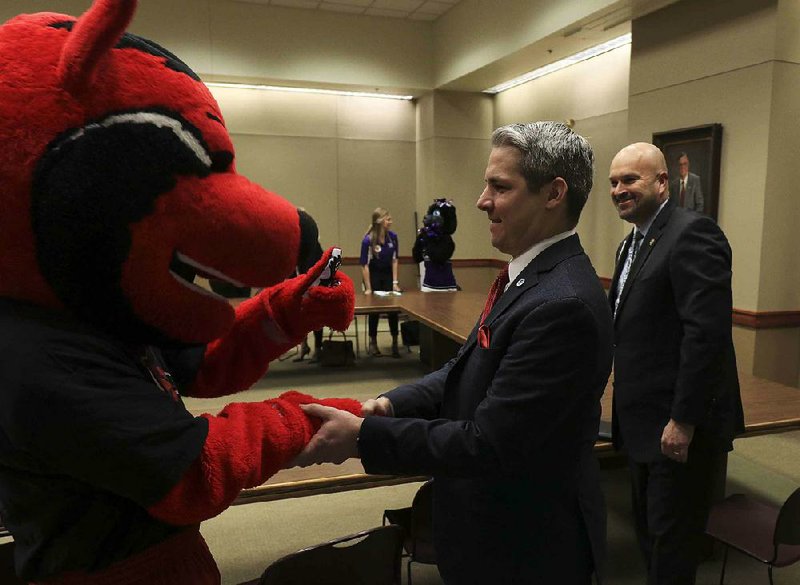An arrest is most often the trigger for people to seek help and recovery for a drug addiction, Gov. Asa Hutchinson told a group of nearly 200 college students gathered Monday at an event at the Association for Arkansas Counties.
The governor, Attorney General Leslie Rutledge, legislators and students from more than 19 college campuses in the state were on hand to kick off "Save AR Students Week," a statewide substance-abuse awareness initiative that runs through Friday.
"People rarely go in to voluntarily getting help," Hutchinson said. "It's usually someone that's confronting them with a problem and it starts with law enforcement."
The governor added that the state needs to do more to expand drug-treatment counseling and educate young people about drug abuse.
"We need to educate every generation that illegal drugs -- particularly, in this instance, opioid abuse -- is harmful to your future. It's harmful to society. It is something that can kill you," Hutchinson said.
Senate Resolution 23, sponsored by Sen. Jason Rapert, R-Conway, designates the week as an opportunity to address the increase in the "over-prescription and misuse of opioids, as well as the issue of increased illicit drug use" in the state.
In a 2017 report, the Centers for Disease Control and Prevention ranked Arkansas as the second-highest in the rate of opioid prescriptions, at 105.4 per 100 persons.
"This epidemic is overwhelming for our state; absolutely, something that we must combat. And it's going to take an above-all approach," Rutledge said. "This challenge of substance abuse, particularly prescription drug abuse, it doesn't care if you're rich or poor. It doesn't care what neighborhood you grew up in. It doesn't care if you're black, white, Hispanic, Asian. It doesn't care. It hits all of us and all of our families."
Those between the ages of 18-22 are at the highest risk for opioid abuse, Arkansas Drug Director Kirk Lane told the crowd.
"Oftentimes started as casual or social use, this may lead to addiction, dependency and catapulting into the use of illicit heroin and fentanyl," Lane said. "The result is permanent. As once addicted to opioids, the user finds himself in a lifelong battle that has three remedies: recovery, further addiction, or death. It is so important that you stand today to be the difference. Quite simply, speak up about drugs. Don't be afraid to intervene in your friend's drug use."
Kimberly Ashley-Pauley implored the students to put their fears of recrimination aside and call 911 if they suspect a friend has overdosed.
After the death of her son, the Joshua Ashley-Pauley Act was passed by the Arkansas Legislature in 2015. The state law, starting at Arkansas Code Annotated 20-13-1701, allows those reporting a drug overdose to avoid arrest for possessing a controlled substance.
Joshua Ashley-Pauley was with friends when they mixed prescription drugs, she said. He passed out and had difficulty breathing, but no emergency crews were called even though a friend recognized the distress.
Kimberly Ashley-Pauley pointed to the hallway and encouraged students to pick up a box filled with fliers.
"It is really sad to me that this could've been prevented," she said. "I will never know whether or not if Josh had gotten to a hospital in time he would've lived or not."
Metro on 03/12/2019

